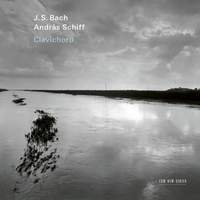Recording of the Week,
Well-tempered Bach on the clavichord from András Schiff
The poor old clavichord rarely gets much attention; overshadowed in brilliance and volume by the harpsichord and organ in early music performance, its natural quietness holds it back from being noticed and appreciated. András Schiff’s latest recording, though, turns things on their head and embraces this as a virtue – leaning into the intimacy and introversion of an instrument whose very sonic unobtrusiveness made it a popular practice aid in the era before headphone-compatible electric pianos.
 It's an all-Bach programme; by way of indirect explanation, the sleeve notes muse on the possibility that for Bach, Clavier (as in Wohltemperirte) may have specifically meant the clavichord, which around his time underwent some significant technical improvements, present in the 2003 replica of a 1743 Specken instrument that Schiff plays here. Did Bach want to show off the new polyphonic possibilities that resulted?
It's an all-Bach programme; by way of indirect explanation, the sleeve notes muse on the possibility that for Bach, Clavier (as in Wohltemperirte) may have specifically meant the clavichord, which around his time underwent some significant technical improvements, present in the 2003 replica of a 1743 Specken instrument that Schiff plays here. Did Bach want to show off the new polyphonic possibilities that resulted?
What’s certain is that he and his contemporaries played the clavichord extensively in private and domestic contexts, and with this in mind Schiff selects some of the more modest keyboard works from the BWV catalogue. No flamboyant Esfahanian pyrotechnics here; the two-part and three-part inventions, often dismissed as mere training exercises or compositional demonstrations, comprise the majority of the album. These are by no means trivial under the fingers, nor dry and uninteresting, and Schiff treats them every bit as seriously as one might approach a mighty organ fugue.
In many ways the clavichord’s tone is perfect for this kind of music – less harsh than the bright sound of the harpsichord, which can be difficult to adjust to, yet having enough of an attack to make polyphonic textures transparent and clear in a way that they might not be on the organ. It’s the best of both worlds – making some of the brisker numbers (the two-part inventions in D minor, F major and G major, for instance) really jump off the page. Conversely, the mechanism of the clavichord offers just enough sustain to create a sense of line over long phrases – it’s particularly noticeable in the contrary-motion chromatic motifs in the two-part invention in E major, and the cantabile mood of the three-part in E flat major.
Book-ending the two sets of inventions are larger-scale works; the album opens with the delightful Capriccio sopra la lontananza de il fratello dilettissimo BWV992, a pictorial suite in miniature in which Schiff takes us with him on a journey from consolation, through dangers on the road and lamentation, to round things off with the jolly sounds of the post-horn. I won’t say that the clavichord really comes any closer to reproducing the actual sound of a horn in the fugal statement than the harpsichord or organ could, but the development of the post-horn motif is much enlivened by the instrument’s ability to alternate between spiky staccato and a more sustained sound. Contemporary keyboard players sometimes suggest that Bach would have preferred the modern piano if he had known about its range of capabilities and sounds; listening to the palette Schiff extracts from the clavichord, this argument starts to look quite compelling.
The same holds true in the Chromatic Fantasia and Fugue BWV903 which closes the album; thanks to the clavichord’s ability to sustain notes, the opening flourishes hang in the air for just long enough to be dramatic. Its modest but genuine responsiveness to the player’s strength of attack permits some sudden rhetorical gestures, such as the forceful spread diminished chords in the latter half of the Fantasia. Likewise, the picking out of key melodic notes from groups – so central to later keyboard writing such as Mendelssohn’s Songs Without Words that pianists instinctively take it for granted – is more possible here than it might otherwise be, enabling Schiff to draw out internal melodies for the listener that might not have been apparent.
In many ways, I feel much the same about this album as I felt about Alina Ibragimova’s beautiful performances of Telemann’s Fantasias for solo violin last October; music that leans towards the drawing-room rather than the concert stage has a beauty all of its own, and the clavichord is the ideal instrument for enjoying this side of Bach.
András Schiff (clavichord)
Available Formats: 2 CDs, MP3, FLAC, Hi-Res FLAC



